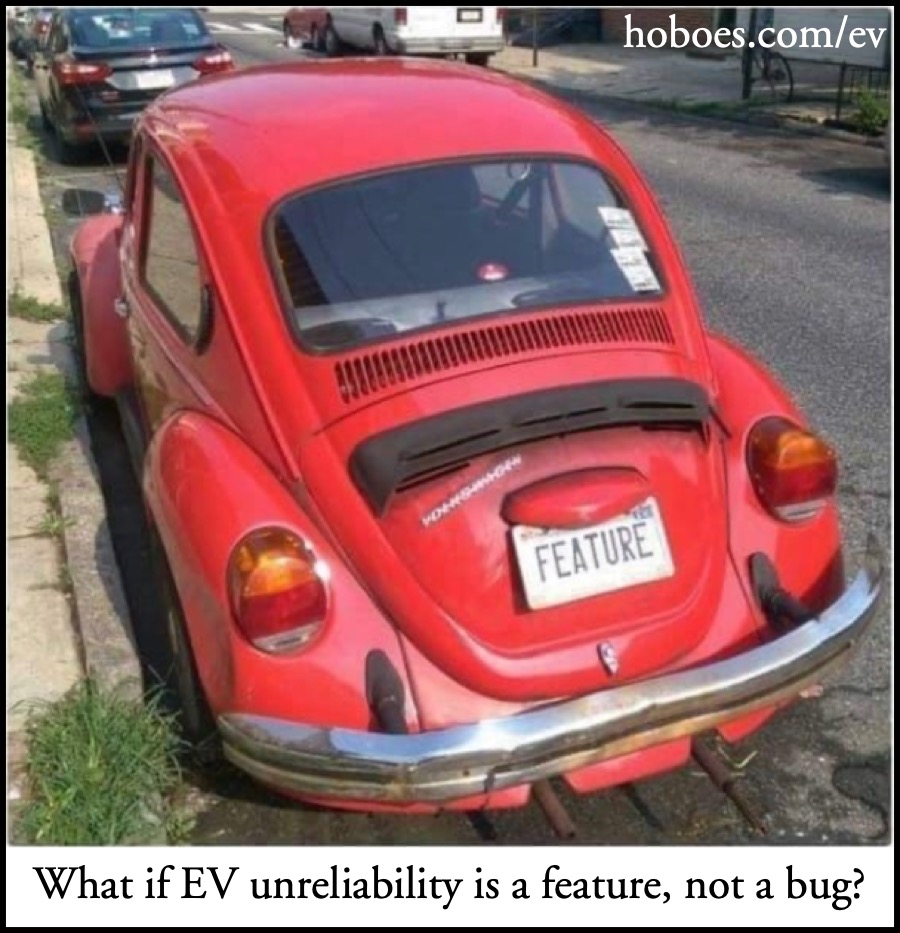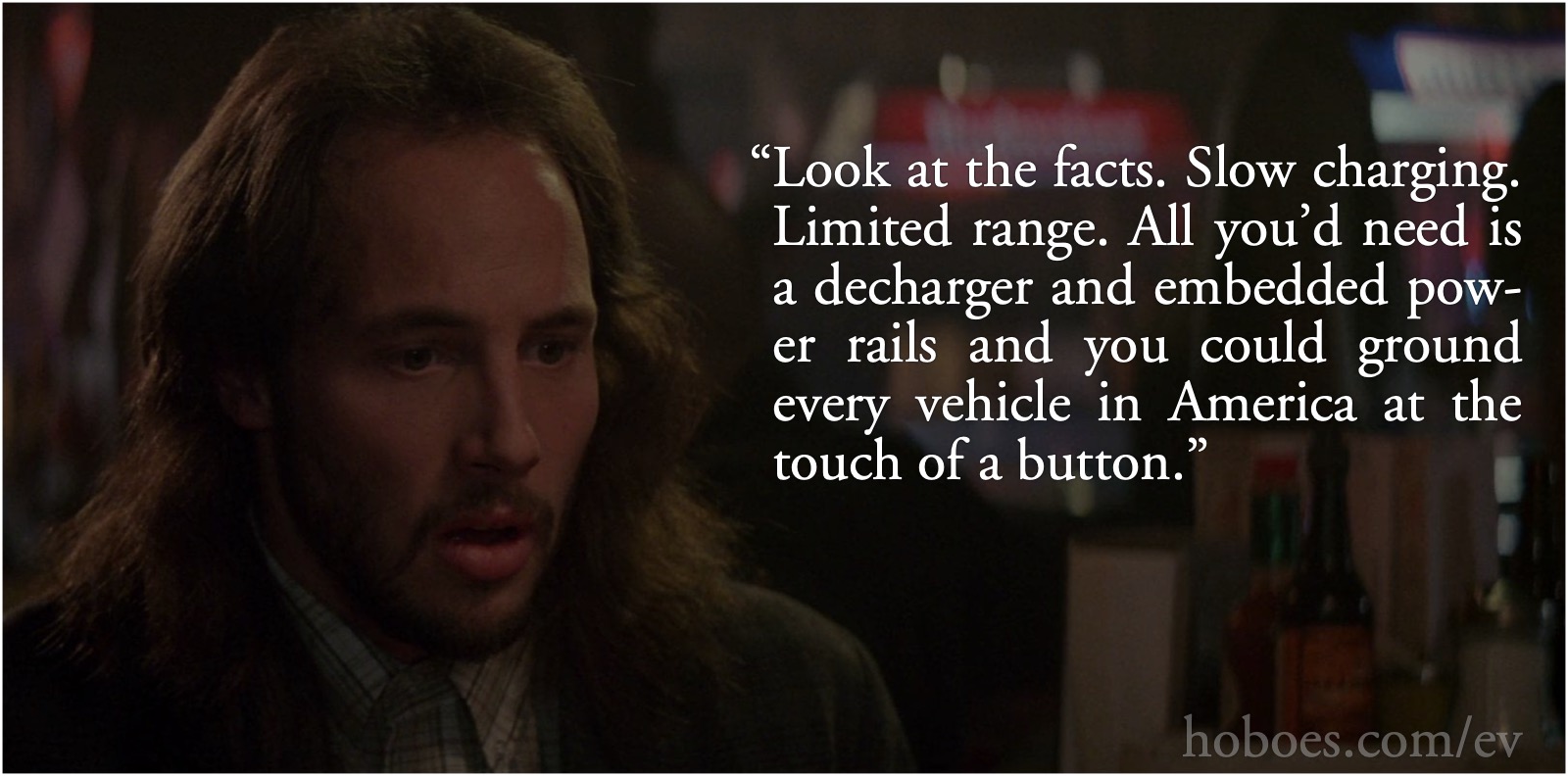Lazlo Hollyfeld on the electric car
In my last post, I wrote about the problems with current battery technology. Today’s batteries make owning a battery-powered vehicle a huge hassle and limit travel options to nearby destinations—or enforce artificially long travel times. In both cases, they require that the destination be one where electricity is available in sufficient quantities for charging a battery-powered vehicle. Trips to out-of-the-way places become very difficult when you can’t just store extra bottles of your power source in the trunk. Battery-powered vehicles already maximize every spare location as battery space.
Any unforeseen problem—temperature, traffic jam, etc.—runs the risk of draining the battery, leaving the driver stranded, even during daily trips. And there is no obvious way forward: the future of battery-powered vehicles requires a completely new battery technology, and we not only don’t have that technology we don’t even know where it will come from.
I’ve sometimes said that electric cars are basically daily beaters at the cost of a sports car, but that oversells them. As a daily beater they’ve got issues as well; I’ve known several people who have bought electric cars thinking they’d use them to get back and forth to work, do their shopping, all their local driving. All but one of those vehicles have since been replaced with gasoline vehicles. That one is owned by a friend who has a habit of buying cars that need constant attention.
I think, at best, today’s battery-powered vehicles are little more than Sunday drive vehicles. You don’t have to worry about filling up with gas or checking the oil; you don’t have to worry about rush hour, or temperature extremes. It’s a wonderful day, so get in, drive around the countryside for an hour or two, and come home.
When you do have to worry about losing power during a traffic jam, or having less of a charge than you thought you did because it’s too hot or too cold, or the parking lot’s charger is already occupied and you’re late for work, they make a lot less sense. It is absolutely insane that some states are mandating battery-powered vehicles today. They do not make traveling easier when that travel has the purpose of getting to a specific place at a specific time.
But that brings up a not-so-obvious question. Are electric cars really meant to make traveling easier? Let’s, as Lazlo Hollyfeld might say, look at the features of the modern all-electric power source, that is, the modern battery:

- The power source weighs down the vehicle no matter how much power is discharged.
- The range of the power source slowly shrinks over time, reducing the distance the driver can safely travel in a session.
- Some of the range problem could be solved by exempting battery-powered vehicles from the heavy-metal mandates that, along with current battery technology, keep their range low. There is literally no one in power calling for this solution, or any solution, to reduce the mass of battery-powered vehicles.
- Production is limited by the rarity of the raw materials that go into making batteries. This limit could be overcome by opening up new sources for mining—something else literally no one in power is calling for doing. We have sources of these materials; we could open them up for mining. But no one who wants to mandate battery-powered vehicles wants to increase the availability of—and decrease the costs of—the resources necessary to create them.
The gold-standard of all-electric vehicles, the Tesla, guarantees only that the car’s batteries will lose no more than 30% of their capacity over the first 150,000 miles. Chevrolet doesn’t even say what degradation is allowed on their 100,000 mile warranty. They require you to go to the dealership to find out. Other sources say it’s the same 30% degradation.
Imagine how well a gasoline-powered vehicle would sell if its gas tank lost 30% of its capacity in the first hundred thousand miles. This loss of capacity appears to be completely unpredictable, and much of it happens in the first two years. This is spun as good news by automotive sites:
“Every electric vehicle loses range differently, including cars of the same brand or year,” said Recurrent CEO Scott Case. “The good news, however, is that several early EV models show us that… there is a noticeable S curve in the data, where cars lose a few percentage points of range from their original EPA estimate relatively quickly, generally in the first two years, then range loss levels off for the next several years as the battery stabilizes. After five years, it is common to see a 5-10% drop in range.
That article is not critical of electric vehicles. In order to avoid being critical, it glosses over what an S-curve means. It means that there is an initial slow decline, a sudden big drop, a longer slow decline, and then a final big drop to zero.
Both of these guides to maintaining an all-electric car’s battery bend over backwards to assure you that there’s no problem. The cars.com guide also assures you that “complete battery pack failure is rare”, and then spends the rest of the article describing the very common ways your electric car’s battery will fail you. I suspect they’re using word play and defining “failure” in a way that doesn’t actually matter to the driver, who just wants to get where they’re going without hassle.
The AutoWeek article ends by saying that the problems some people see with aging batteries “may be an anomaly” because one study showed only a loss of 5% in the first 25,000 miles. Would anyone be willing to put up with a loss of 5% in their gas tank’s capacity after the first year or two?
And these are just the basic problems that all batteries have under all regimes. They don’t get into some of the crazier ideas various governments and organizations are pushing. There are even initiatives to turn your charger into a decharger. Imagine going to fill up your car and the gas station sucks gas out of your tank so that you have less after refilling it than before. When you ask why, it’s because some government bureaucrat or computer program decided some other neighborhood or person needs the gas more than you do.
That’s a real, serious proposal for battery-powered vehicles. It’s called vehicle-to-grid. California is set to require it, under the misleading term “bidirectional charging”, for all cars by 2030. They’re pushing it as voluntary, but once that hammer is available every bureaucrat in the power chain will want to use it. If Sacramento loses power, it will be a crisis that justifies involuntary vehicle-to-grid decharging.

Trolleys are very quaint. But would you want to buy a car that only went where rails are laid down?
When vehicle-to-grid is implemented, you won’t even be able to trust that charging your car will leave you with more rather than less power. Vehicle-to-Grid nerfs one of the few advantages of battery-operated vehicles: that you can be sure you have a full “tank” when you leave your garage, ready for any quick trip or emergency.
Perhaps, as Lazlo Hollyfeld told Chris Knight, someone already has a use for battery-powered cars: reducing the mobility of the American people.
That would explain why the only viable power source for all-electric vehicles, so far, is embedding power lines into public roads. While it solves the problem of range, it turns freewheeling cars into trains, limited to where tracks have been laid and when the power is turned on. The left has long decried the loss of rail travel as motorists turned to personal vehicles for full travel freedom. Embedded power lines erase all that progress.
Worse, such roads would, within a few years, also end up carrying commands that all-electric vehicles would be mandated to obey. Automobile use would be fully under the centralized control of government bureaucrats—or anyone who hacked the system.
Barring turning roads into railroads and cars into remote-controlled trolleys, all-electric vehicles will always require batteries. Which means that to work, all-electric vehicles need batteries that use simple, easily acquired materials that last forever and are quickly recharged. Until we come up with new batteries, all-electric vehicles are just an exercise in reducing the mobility of drivers.
Mandating electric vehicles will do nothing but destroy the mobility of the poor and middle class. It will be incredibly destructive to society, to the supply chain and prices, and to everything that upholds our quality of life, health, and leisure.
But to government bureaucrats and the beltway class, destroying other people’s lives is not a bug. It’s a feature.
In response to What will a useful electric car look like?: New technologies win by being better than previous technologies, not worse. The modern battery-powered car is ridiculously close to its turn of the century counterpart. They may look more modern, but the same hundred-year-old technology that has never met the needs of drivers still powers them and hobbles them.
battery-powered cars
- The Morning Rant: Bleeding Red Ink, Ford Boldly Decides to Lose Money on Individual EV Sales… then Make It Up in Volume: Buck Throckmorton at Ace of Spades HQ
- “So Ford is going to lose money on a per unit basis, but try to make it up in volume. That’s a bold strategy.”
- Predicting How Much Range EV Batteries Lose Over Time: Jim Motavalli
- “Many variables go into electric vehicle battery range degradation, but a few factors are known contributors.”
- Your Guide to EV Batteries: Premature Death, Range Loss and Preservation: Joe Wiesenfelder
- “What all EV shoppers and owners should be aware of, even concerned about, is that all rechargeable batteries lose capacity with use and time, even if you do everything right.”
freedom of movement
- Here’s how California’s electric cars can feed the grid and help avoid brownouts: Alejandro Lazo
- “This year, a bill already approved by the state Senate in a 29-9 vote would require all new electric cars sold in California to be equipped with bidirectional technology by 2030. In the Assembly, two committees approved the bill earlier this month and it is now under consideration by a third.”
- Socialized gasoline: The bureaucratic miracle of Vehicle-to-Grid
- Vehicle to grid, when managed by governments, will mean taking your car’s fuel and giving it to somebody else who needs it more.
- Those EV Shortcomings Aren’t Shortcomings at All: John F. Di Leo at American Thinker
- “The modern Left has a dream–that soon, very soon, every vehicle in the world will be electric, running on a heavy, cobalt-laden, lithium battery that needs to be charged up somewhere with electricity derived from an out-of-sight coal plant.”
Real Genius
- Lazlo at Real Genius•
- “I’ve been thinking about that laser you’ve designed…“
- Real Genius•
- A movie about college kids that didn’t dumb down college to get its laughs. One of my favorite movies.
More battery-powered cars
- What will a useful electric car look like?
- New technologies win by being better than previous technologies, not worse. The modern battery-powered car is ridiculously close to its turn of the century counterpart. They may look more modern, but the same hundred-year-old technology that has never met the needs of drivers still powers them and hobbles them.
- Socialized gasoline: The bureaucratic miracle of Vehicle-to-Grid
- Vehicle to grid, when managed by governments, will mean taking your car’s fuel and giving it to somebody else who needs it more.
- Zeno’s motorcar
- Automobiles are awesome machines. But sometimes it seems as though they’re stuck twenty years in the past.
More New Barbarism
- Innovation in a state of fear: the unintended? consequences of political correctness
- Is political correctness poised to literally kill minorities as it may already have killed women, because scientists avoid critical research in order to avoid social media mobs?
- Barbarism and the Global Village
- If we don’t protect our borders, we don’t protect our civilization. When Rome let the barbarians in, they became barbarians.
- Money Changes Everything: Empowering the vicious
- Barbarism empowers the rich, the powerful, the vicious, the strong. Civilization empowers everyone else. Gun control and centralized economies, darlings of the progressive left, have empowered the vicious since the beginning of time. The beltway crowd prefers no competition from people free to barter, or free to defend themselves.
- The new barbarism: A return to feudalism
- The progressive left seems to have no concept of what civilization is, and of what undergirds civilization.
- Science by consensus is barbarism
- The scientific method is pure, distilled civilization. It is completely unnatural.
- 17 more pages with the topic New Barbarism, and other related pages
More Real Genius
- Apple’s spinning mirror: exploiting children for dictatorships
- Apple has decided on “child porn” as the root password to disable privacy on their phones. But the system they’re using appears to be mostly worthless at detecting the exploitation of children, and very useful for detecting dissent from authoritarian governments.

